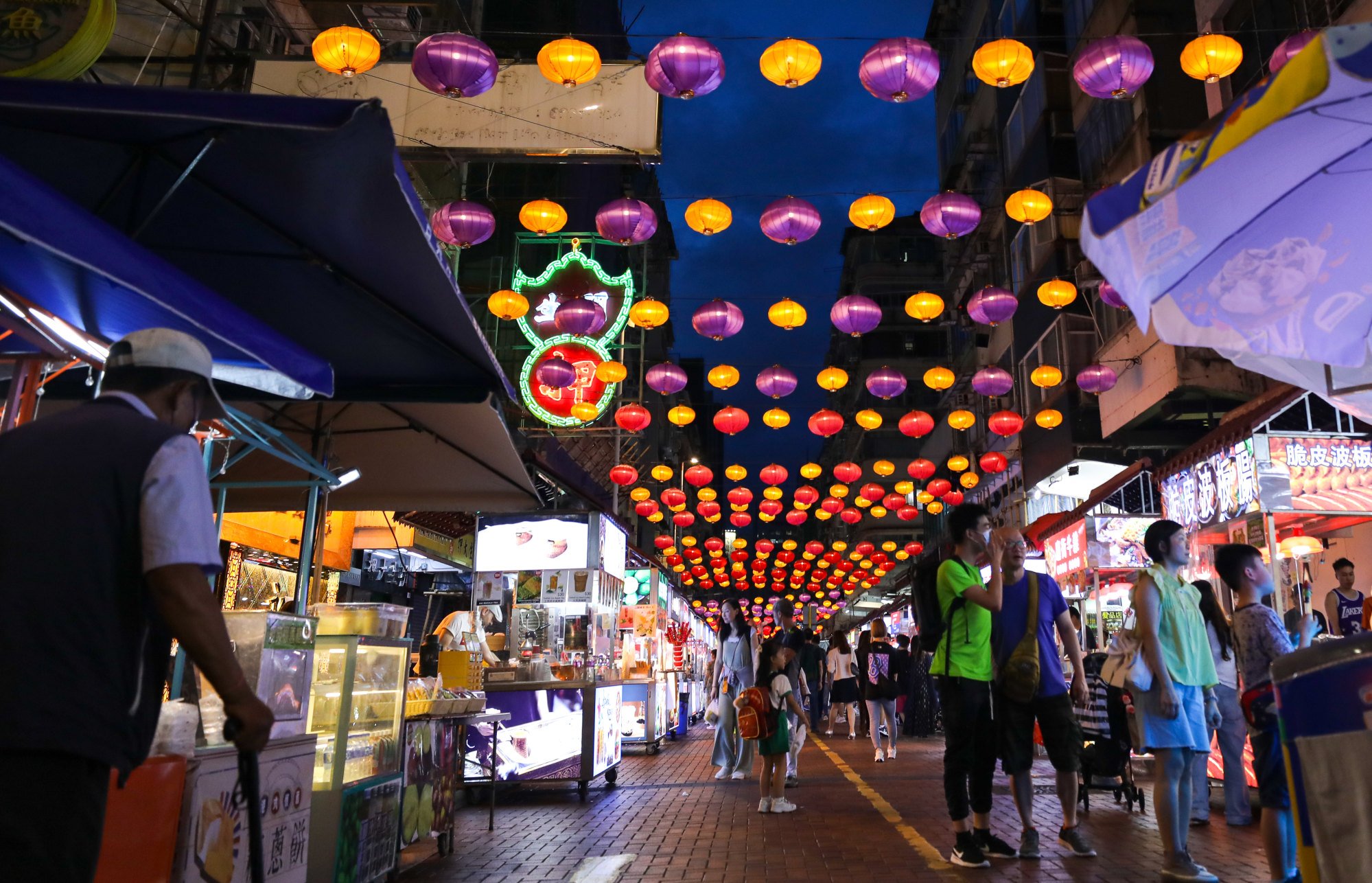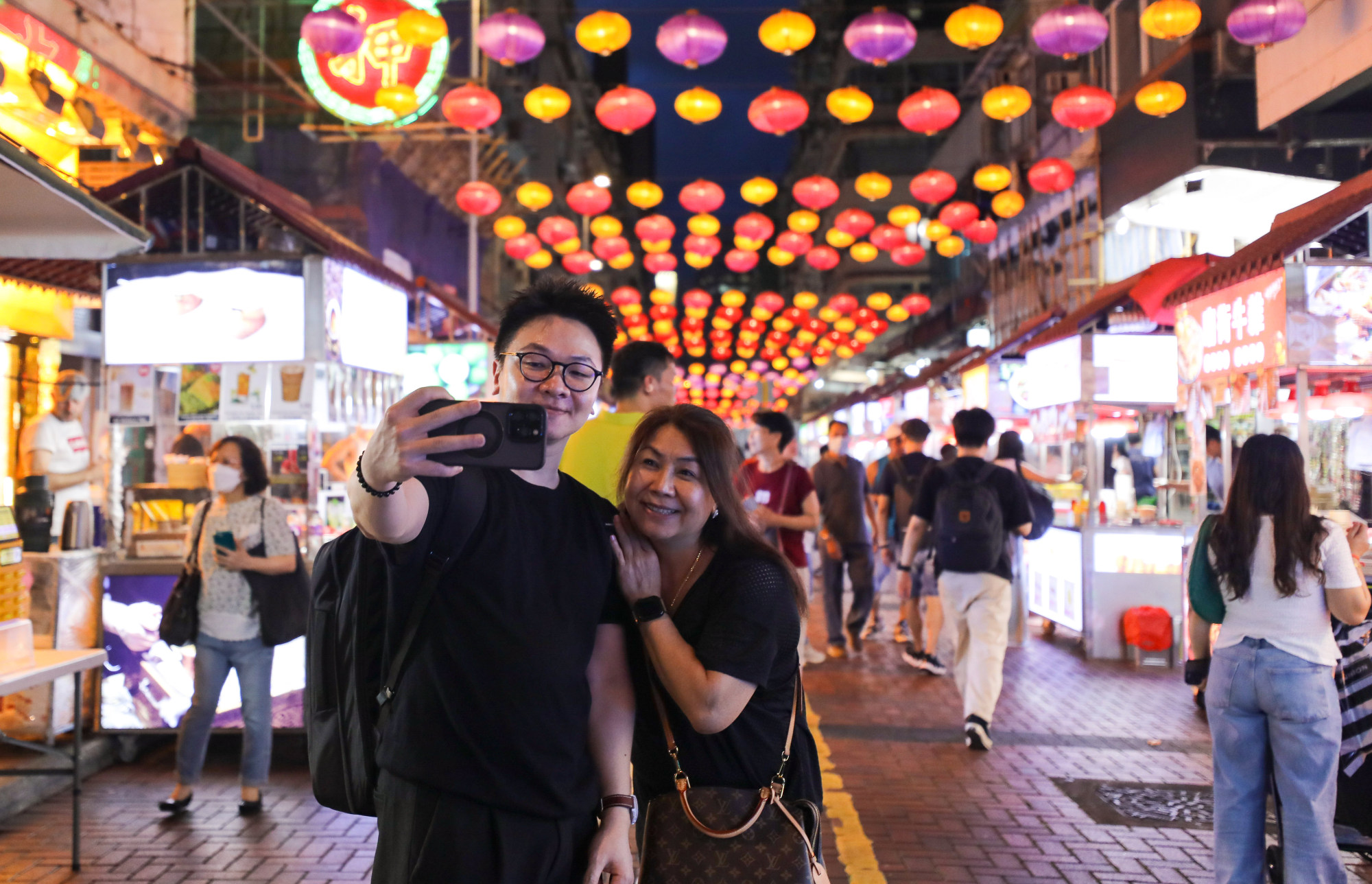It was a warm evening and there were dozens of visitors at Hong Kong’s Temple Street night market in Yau Ma Tei.
Food and drink sellers offered everything from Turkish coffee and bubble tea to Taiwanese buns, dim sum, snake soup, stewed beef offal and more – the latest additions to the 350 metre (1,142 feet) strip of stalls selling clothes, costume jewellery, souvenirs and trinkets.
Although the crowd grew as the evening went on, the scene remained a stark contrast from January, when the temporary market launched with much fanfare and visitors – tourists and locals – thronged the place.
Do you have questions about the biggest topics and trends from around the world? Get the answers with SCMP Knowledge, our new platform of curated content with explainers, FAQs, analyses and infographics brought to you by our award-winning team.
Vendors said they had noticed the drop in footfall in the area.
“The popularity and energy around this street is dying down, and there are fewer visitors,” Peter Nul, 60, who sells handmade necklace charms, said.
Nevzat Durmus, 51, a Turkish restaurant owner who runs a coffee stall, added: “In May, we had a lot of rain, so things became slow.”
But he said he remained hopeful the summer holidays would bring more business.
The Temple Street night market has become the last major holdout of the government’s “Night Vibes” campaign.
The initiative was launched by Financial Secretary Paul Chan Mo-po last September to reboot the city’s nightlife after three years of pandemic-induced restrictions with night bazaars, shopping and dining discounts, and special events.
Some established, traditional events that were halted or downsized during the pandemic, such as the annual Wine and Dine Festival and holiday fireworks over Victoria Harbour, were incorporated in Night Vibes.
But, nine months in, the campaign appears to have fizzled out.
Officials rarely mention it and authorities’ attention has shifted to new tourism and economy-boosting initiatives such as mega events.
Stakeholders, unclear whether the campaign is still going on, have been left questioning its effectiveness and asking: “What now?”
The Temple Street attraction, at least, will run to the end of the year.
Meant to last six months, it attracted 1.5 million visitors over the first five months and was extended by another six months from mid-June.
The Tourism Board in April promised more decorations, wider food options and promotions for the strip, including a music video by veteran pop singer Wan Kwong.
The campaign also included a series of short-term weekend night markets along the waterfronts of Wan Chai, Kennedy Town and Kwun Tong last year – but these have all stopped.
The calendar on the campaign’s official website also showed events up until January 2024.
A spokeswoman for the Financial Secretary’s Office did not say whether the Night Vibes campaign had ended, but told the Post it had received “positive feedback from locals and tourists alike”.
Lantern carnivals held during the Mid-Autumn Festival last year drew about 660,000 people and individual retailers reported that business was boosted by up to 30 per cent.
The spokeswoman said the post-pandemic change in lifestyle habits needed time to settle, and that the government would consider the views of the public and review the effectiveness of campaigns.
“The government will keep exploring every possible means, such as promoting mega events and so on, to boost our overall economy, including the nighttime economy,” she said.

‘First-class shows for a first-class city’
Entertainment tycoon Allan Zeman said he believed the Night Vibes campaign was able to generate a “temporary boost”.
“You could say it fell short of providing a comprehensive solution for Hong Kong’s economic revival,” he added.
Zeman, the chairman of entertainment giant the Lan Kwai Fong Group, said the campaign events were “haphazard” and much smaller-scale than expected.
Curiosity generated by the hype drew people at first, but the events did not prove compelling enough to make them want to return on a regular basis, he added.
He said the Temple Street night market was tiny compared with the sprawling markets in London or Bangkok that spanned several blocks.
Zeman added the strong Hong Kong dollar had also deterred tourists and residents from spending in the city, which also explained why 200,000 Hongkongers headed across the border to mainland Chinese cities such as Shenzhen every weekend.
“It’s much cheaper – the restaurants, the spas, everything,” he said.
Zeman highlighted that, although Hong Kong visitor numbers had risen steadily, spending had not gone up in proportion.
Tourism Board figures showed there were 3.4 million visitors in April, a 17 per cent increase on the 2.89 million recorded for the same month last year.
But statistics showed retail sales in April dropped 14.7 per cent from a year ago.
Annie Tse Yau On-yee, the chairwoman of the Hong Kong Retail Management Association, said recently that the city’s retail sector had hit rock bottom and the outlook for the full year was grim.
She added visitor preferences had also changed and mainlanders, who made up the majority of tourists, were now more focused on experiences rather than shopping.
Zeman added that continued tension between Beijing and the West meant Hong Kong had yet to attract international visitors back.
He said Hong Kong had to provide top-notch events to combat external problems and justify the premium cost of visiting the city, as well as take full advantage of the new 50,000-seat Kai Tak stadium, expected to be completed by next year.
“We should do about three shows a month, some big, some small and bring in entertainment from around the world – the US, UK, Korea, Japan,” he said. “Artists who are very well-known around the world.”
He added the government might have to pay promoters to attract big names, as Singapore had done to secure superstar Taylor Swift’s performances in the city state.
But Zeman insisted the investment would be worth it to make a splash and reintroduce Hong Kong to the world.
“International visitors don’t come for small street markets or pyrotechnic shows,” he said. “You really need to go first class.
“Hong Kong is a first-class city, not business class or economy.”

A need to review, seek public views
Lawmaker Doreen Kong Yuk-foon said the Night Vibes campaign exposed a lack of continuity and sustained effort.
“The government often launches new initiatives with great enthusiasm, but fails to follow through with proper monitoring and assessment,” she added.
Kong said she had noticed that the night markets became quiet after about a month, with some stalls closing early because of lack of business.
But she added there had been no analysis of attendance numbers and whether the goals of the Night Vibes drive had been met.
Officials had said soon after the campaign kicked off that it would be best not to quantify how the drive boosted the economy.
Deputy Financial Secretary Michael Wong Wai-lun said it was more important to look at the social impact – but Kong disagreed.
“These things are necessary so we can properly monitor, assess, learn from the experience and avoid repeating mistakes,” she said. “If things don’t work out, that’s fine. It’s not that we want to blame authorities for trying something new.”
She said there should be a more transparent review because authorities were accountable to taxpayers and should explain what was achieved.
“The problem now is that we never do any reviews, so we keep doing the wrong thing once, twice and a third time,” Kong added.
She said the government should also be more open to public input and questioned whether it had done enough to consult Hongkongers on what they wanted.
“If you want to gain the trust of Hongkongers and increase their happiness, public engagement is very important,” she added.
Kong said the uncertain and temporary nature of Night Vibes events contributed to a vicious circle.
“No one wants to make capital investments in things that aren’t going to last, which leads to subpar products that are not exciting or high quality,” she explained. “So how do you expect to attract consumers this way?”
Kong said it might be better to allow the private sector to take the lead in similar campaigns in future.
“They are bound to do much better because they are the real talents in their fields with the correct experience,” she added.
A local restaurateur who took part in the waterfront night markets agreed authorities lacked the organisational skills needed.
The businessman, who asked not to be named, said he was frustrated with the way the night markets had played out.
He singled out the first two days of the Wan Chai bazaar last September, when power supply disruption left some vendors struggling to serve hot dishes.
Others were unable to accept electronic payments or had to operate in the dark.
“That’s the thing, they talk, talk, talk, but have no idea how to do it,” he said.
“They should hire professional companies if they want to organise a great market for Hong Kong because, from the way they handled it, it doesn’t even feel like they cared.”
The restaurateur added that authorities should also be more open to different views, especially those of young people.
“They need to understand what youths want as well because right now with your old-school 50- and 60-year-olds, what can they do to facilitate change?” he asked.
“Nothing, because they’re all bureaucrats who don’t listen.”
Sye Man-fu, a watch seller in Temple Street, said that the Night Vibes campaign should be renamed “Quiet Vibes” because of the low number of visitors to the night market.
“Temple Street is like a thermometer for Hong Kong’s economy,” he said. “The size of the crowd, energy and visitors here reflects the state of the city’s economy.”
More from South China Morning Post:
- US President Joe Biden renews Hong Kong’s ‘emergency status’ in executive order
- Hong Kong Ani-Com 2024 to showcase city’s comic culture globally, organiser says
- Hong Kong’s revamped Temple Street night market draws 1.5 million tourists and locals in 5 months; attraction extended until end of year
- Keep the party going but add new blood: call to revitalise Hong Kong’s Temple Street, make night market permanent as crowds return
For the latest news from the South China Morning Post download our mobile app. Copyright 2024.





